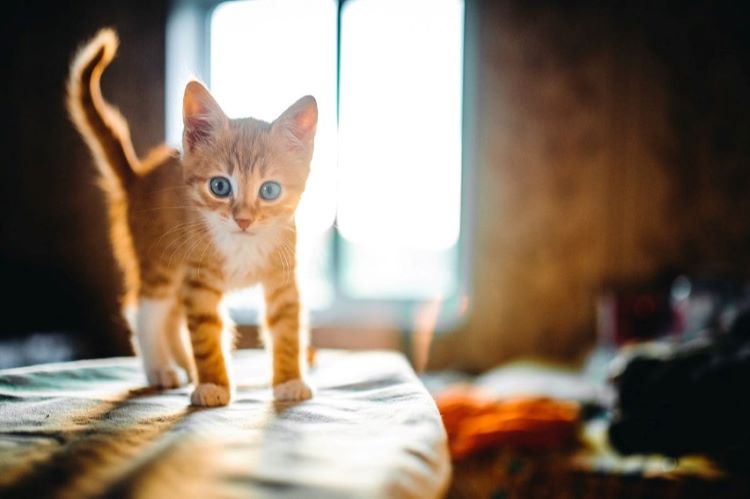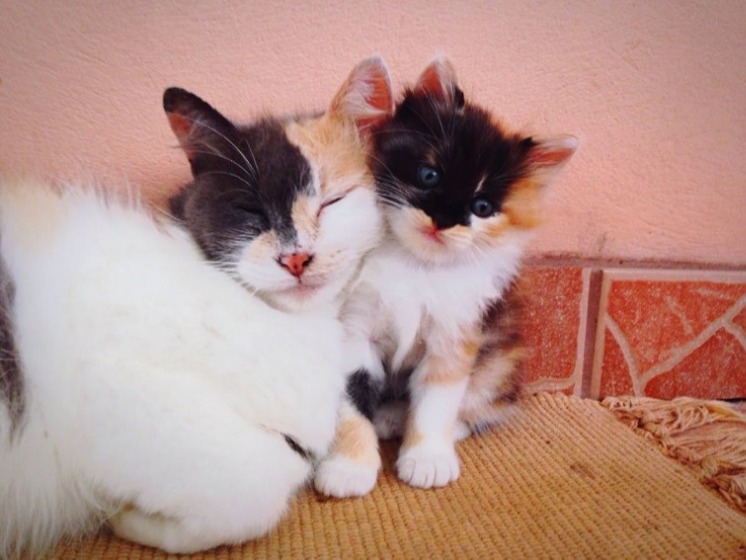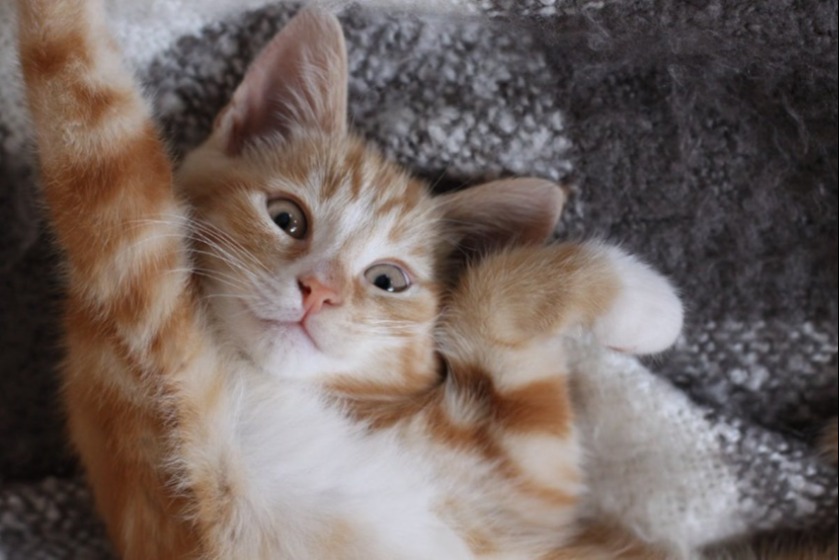Ready to help treat your pet to a healthy life?
Common Kitten Health Issues to Watch For
By : Kelli Rascoe & Trupanion Staff | Updated Nov 14, 2023

Kittens, like all young animals, are susceptible to certain health issues. Since your pet can't tell you how they are feeling, however, it's a part of responsible pet ownership to monitor your kitten's health and be aware of the signs that indicate you should seek veterinary care. This includes learning common kitten illnesses and the risks that come with them.
Cats can get sick at any age. However, kittens (typically considered cats ages 0 to 18 months) may be particularly at risk of as they grow and start being exposed to more of the world around them. If you currently think your pet may be sick, give your veterinarian a call. Otherwise, keep reading for what kinds of health conditions are common in young cats and how to spot them. All kittens — even ones that appear healthy and have no previous health issues — should be considered vulnerable since their immune systems are still developing.
6 common kitten illnesses and their signs
Feline illnesses can range from minor to serious, and it can be tough to determine what might be wrong. Many common kitten health issues likewise share similar signs, though it's still worth being familiar with the conditions your pet may be most susceptible to.

This list is not all-inclusive. You kitten's particular health risks can depend on their genetics (including breed), and this is why it is so important to keep up with routine veterinary visits and get professional assessments. While intended to serve as a useful guide, the information here is not a substitute for in-person veterinary care and advice.
That said, here are some common kitten health issues every pet owner should know and watch for:
1. Gastrointestinal issues
An upset stomach may affect all pets, including your new kitten. While it may seem minor, an upset stomach or changes in bowel movements (including loose stool and diarrhea) in young cats should never be taken lightly. In many cases, gastrointestinal issues are temporary. However, it's still important to contact your veterinarian, especially when occurring in young kittens.
“It is important to seek medical care for vomiting and diarrhea, especially if severe, as your cat can quickly become dehydrated," says Trupanion veterinarian Dr. Sarah Nold. "This is especially true in kittens, due to their small size."
There are many reasons why your kitten may be experiencing gastrointestinal upset, including (but not limited to):
- Intestinal parasites
- Foreign body ingestion
- Inflammatory bowel disease (IBD)
- Feline immunodeficiency virus (FIV)
- Feline leukemia (FeLV)
- Toxins
- Medications
- Infections
- Allergic reaction
- Stress and anxiety
2. Foreign material ingestion
While dogs are often the ones associated with eating things they shouldn't, cats are not immune. Kittens in particular are curious by nature, and they like to interact and play in their new home. While this behavior should generally be encouraged, it's important to keep a close eye on your pet and make sure they aren't consuming anything that isn't their own food. Foreign material ingestion is a common pet insurance claim, and if not treated quickly it can lead to serious complications.
“Cats seem to be more likely to swallow things they like to play with like string, hair ties, rubber bands, or sewing needles,” says Nold. "Unfortunately, all of these things can cause serious internal damage and can also lead to infections or even death in some cases."
Signs of foreign material ingestion in kittens may include:
- Decreased appetite
- Vomiting
- Diarrhea
- Gagging
- Lethargy
If you think your kitten has ingested anything they shouldn't have, seek emergency medical care right away. Don't wait for symptoms to appear or worsen — if the item ingested is toxic or has the potential to cause physical damage, time is of the essence.
3. Bone fracture
It may sound unbelievable, but young pets can get fractured and broken bones just from being themselves. Keep in mind that your kitten is still developing and may not have full control over their movements yet. As your kitten explores, they may jump into furniture, shelves, or other objects, and they may also be more at risk of miscalculating leaps to different surfaces.
According to Nold, a fractured bone is more common than many pet owners may think, though they may be underdiagnosed. Cats in general are great at hiding pain, so these injuries may not be noticeable right away.
“The most common sign associated with a fractured bone in a limb is lameness, usually non-weight bearing," she explains. "You may also see localized swelling and your pet will likely guard the area, as it is quite painful. Be cautious about trying to examine the area, as they could try to bite or scratch you.”
4. Urinary tract infection (UTI)
A urinary tract infection or UTI is a fairly common health condition in cats of all ages. It is caused by bacteria entering the urinary tract and may be most prevalent in cats who do not drink enough water.
“Cats are good at hiding any signs of illness. However, signs you may notice with a urinary tract infection include: urinating more frequently, urinating outside the litter box, blood in the urine, and straining to urinate.”
If you notice your kitten is having any issues urinating, please seek veterinary care. While most urinary tract infections are minor and some may even clear up on their own, there is no way to tell without professional evaluation and diagnosis. Many UTIs start small but get progressively worse without proper treatment, leading to serious complications that could result in major medical care needs for your pet.
5. Urinary obstruction
Urinary issues may start as infection and lead to more issues. Does your kitten vocalize in the litter box or go in there without leaving behind any evidence? If so, there may be a urinary obstruction that is preventing your pet's body from performing as it should.
“Signs of a urinary obstruction include all the same signs as a urinary tract infection," Nold says. "If you notice your cat vocalizing or yowling in the litter box or an inability to urinate you should treat it as an emergency.”
A urinary tract infection and a urinary obstruction may be the result of a secondary health condition. If your cat has any issues, seek medical care. Your veterinarian can help ease your kitten’s pain and get to the root of the problem.
6. Parasites
Both puppies and kittens are prone to parasitic infestations, especially if they have spent time living outdoors or in a shelter in close quarters with other animals. This is why it's very common for young pets to be "dewormed" before they are ready to head to their new homes. That said, only some of the offending parasites are actually considered worms. The most common parasites found in kittens include hookworms, tapeworms, and roundworms, as well as Giardia and Coccidia — two microscopic parasites that are not technically worms.
Signs of a parasitic infestation in kittens include:
- Vomiting
- Loose, mucus-like diarrhea (may contain signs of blood or even visual parasites)
- Fever
- Fatigue
- Shaking
- Lack of alertness / confusion
- Going to the bathroom outside of the litter box
- Decreased appetite
- Potbellied appearance
Keep in mind that it's always important to have newly adopted kittens checked for parasites, even if they are showing no signs or have a clean bill of health from the shelter. Small infestations may give your cat no symptoms at all but can become much more invasive if not treated. Even once your pet has been successfully treated and declared parasite-free, it's important to keep up with parasite prevention for the rest of their life.

Protect your kitten from unexpected illnesses
Finding a veterinary team you trust and setting up routine health checkups for your kitten is a part of responsible pet parenting. But since you can't predict exactly when your cat will get sick or need surprise medical care, it's a good idea to protect them with pet insurance if you haven't done so already. This way you can seek emergency care and say 'yes' to necessary treatments when those unwelcome surprises do happen (without worrying about the impact to your budget).
By being proactive, seeking medical care, and preparing for the unexpected with cat insurance coverage for your kitten, you can rest easy knowing you have help if something happens to your best friend.
You're on a roll! Keep learning about your kitten's health with tips from our cat care guide.
